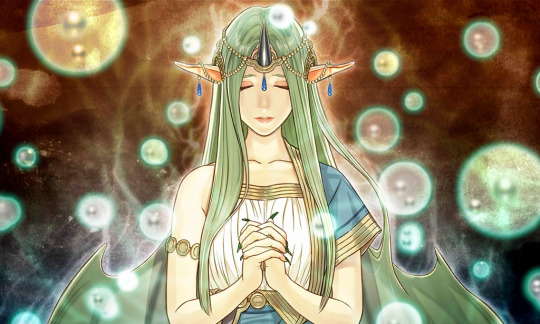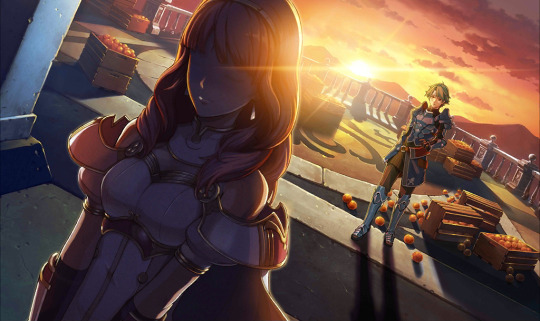#tldr: duma and mila weren't the only rotten thing about Valentia
Text
To Live As Free Men and Women

Over and over again I hear the conflict of echoes summarized as “shifting from relying on gods to relying on humanity’s own accomplishments.” And on the surface that makes perfect sense. All the endgame quotes are about refusing to bow down to Duma and wanting to fight for their world.
However this reading has always not sat well with me because of two things. First this celebration of humanity’s individual strength is not brought up until the last moments of Act 5. To call it the main theme when so much of the earlier conflict was about class feel disingenuous. Second, this reading tends to pit Alm and Celica as opposites where Alm shows Celica the light. Aside from disliking the convenient dismissive treatment of the female protagonist, my obvious bias aside, it just isn’t good storytelling to have one of your leads solely exist to be wrong. Not to mention the game is going for a sort of dualism between the two of them, so to paint Celica’s route as just one mistake is short-sighted.
So the question remains, what is the main theme of Echoes? Does it have a theme? Regardless of your thoughts on the game, it still sends a message, every piece of art does, even if it is as banal as “good will always triumph,” that is still a theme. So to examine echoes, thoroughly we have to find a thread that manages to link the entire game together.
The best place to start is obviously the beginning. After the opening video. We are given a little exposition dump about the state of Valentia. Two countries and two gods, one emphasizing war and the other emphasizing peace. Makes sense, it is pretty obvious which one we’re supposed to root for and what country we’ll be following. Cue the prologue where after everyone was so excited to meet the knight in the woods, he turns out to be totally willing to murder children. It would be so easy to write Slayde off as a bad apple but the narrative makes no attempts to try and act as if anything about him is non-standard. If anything the start of Act 1 goes out of its way to detail just how rotten Zofia is. It’s fitting that Alm joins a rebellion first and foremost, and it is not until Act 3 Rigel really becomes an antagonist. And much of Act 1 is targeting Zofia’s own corruption, its bandits and power-hungry nobles. Despite being massive problems, Alm rushes headlong into them, wanting nothing more than to protect people.
Act 2 starts similarly, Celica learning of just how horrible the pirates are, and how they have been allowed practically free reign of the seas. She has even fewer reasons to get involved, considering her party is literally five people, but she can’t secure safe passage otherwise so let’s do this. If it takes fighting necrodragons then she will fight necrodragons.
Despite both of their reckless behavior, they accomplish real change and make things for the better. And so after growing up into the people they are today, Alm and Celica in an obviously heartwarming manner. Except quickly things tilt sideways.

Celica’s hypocritical behavior has been long-pointed out, wishing him to avoid bloodshed after just killing a pirate king, but things still stay civil until this moment.
“Alm: Nrgh… If I didn’t know any better, I’d swear I was speaking to a blue blood. My station doesn’t matter, Celica. I’m here because I was called. I have a duty to perform, and I’ll perform it. No more, and no less.
Celica: Oh, Alm…
Alm: Do you think I WANTED this fight? This all started because Lima IV went and angered the empire. If you wish to point fingers, point them at the ruler who failed his people. It’s his fault we’re in this mess.”
Alm points to Lima and the system that failed Zofia, and while he is not wrong, as the Zofian heir, Celica is just as much a part of that system. And to have someone so important to her throw the failings of the state at her feet, when all her life she has simply tried to survive, feels like the worse betrayal. And when Alm still expects her to hold responsibility for all those mistakes (even if he doesn’t directly ask it of her) she explodes. Now obviously Alm didn’t know how his words would impact her, and Celica was the first to go on the offensive, but often this discussion gets characterized as just being about violence, when that discussion is just a footnote to the real conflict.
Starting with Alm, Act 3 opens with Alm finally meeting Berkut face to face, someone who represents all of Rigel’s teachings about power and strength. While a fearsome opponent, he has an utter meltdown after Alm’s army beats him. As they go on their way to face Desaix, even Clive starts to fail Alm by doubting him and questioning if it is worth it to try and save Delthea, and depending on how well you play the next few levels, he really might fail Alm such as when/if Mathilda dies and he blames Alm for her death. While he still will eventually come around to believe in Alm once again, we see that even after retaking Zofia, the old order is still not completely gone.
Celica meanwhile has to confront another outlaw king, but this time Greith is more personal, aside from people in her army having been directly harmed by him, there’s this lingering thread of Greith only having been able to grow so powerful because of Lima’s negligence. In-universe there is no reason she has to go and stop him, it is a significant detour from her pilgrimage, still she refuses to enable this injustice. Greith warns her that there will always be another one like him, and when they arrive at the temple, Mila is gone and unable to fix everything like she wanted to do. So Celica does what she has been running away from her entire life, she reveals her status as the lost princess and promises to protect Zofia and Mila.

However while this is a good choice both for her development and from a logical standpoint, we start to see that even it is not without consequences in the Act 4. Determined to save Mila, Celica eventually comes into contact with Jedah, who says as long as she gives up her soul to Duma, he will return Mila. Now while Celica is often lambasted for this choice, let’s look at how she sees this and why she doesn’t immediately distrust him.
While we have seen Jedah be a creep all game, this is the first time Celica has seen him, and while he is othered and marked evil with a lot of traits, such as his blue skin, how stupid would it be if in real life you refused to work with people because “they looked evil” not to mention he is the leader of a similar faith, it would be like if a protestant Christian talked with the Pope. Jedah is a scumbag but Celica has no reason in her eyes to immediately distrust him/assume he is lying.
And having traced Celica’s actions up until now, how she hates the suffering of others and will do anything in her power to fix things, why would she not consider herself a worthy exchange for Zofia’s restoration? With Conrad’s reappearance, there’s even another heir ready to take over. All her life she’s been confronted with her father’s failure, and what kind of ruler would she be if she followed in his footsteps?
Still despite this mindset, she does not go to Duma Tower to die. She plans to see Mila and rescue her first and foremost. But when it looks as if Mila is completely gone and impossible to recover, she decides she will at least try and protect those she loves.
Before we can look at how that decision go, we need to return back to Alm. In Act 4, we learn that Rigel is pretty much as corrupt as Zofia. People like Nuibaba and Jerome manipulate good people like Zeke and Tatiana purely for their own selfish gain. Throughout all this Alm is treated as if he is already King of Zofia, which Alm never really confronts and very obviously chafes at the thought. He stands poised to become a living legend, when horror of all horror he ends up being the one to kill his own father.
While Rigel welcomes him with open arms as there prince, Alm finds no joy in the title and learns that all his hard work was just to fulfill Rudolf’s plans. And the closer he gets to the climax the more and more trauma he suffers, having to kill his only remaining family left, Berkut having gone mad from his failure to live up to Rigel’s ideals of power over everything. In the end it culminates in Alm having to even kill the woman he loves.

The only thing that keeps this story from becoming the tragedy we first saw at the beginning of the game is the fact Mila takes pity on them and decides to release Falchion for Alm. So to act as if the events of Echoes were purely fueled by human ingenuity is disingenuous.
So what was the point of this little recap? Well when you look closely you see it is not just Duma and Mila who failed them, but the entire way their world was structured, the sins of their fathers who created/maintained a world where the weakest were always exploited the most. A world where they were denied happiness and set up to fail. Celica has her entire life defined by being a part of this system, less an individual person and more a title. What use was she as an individual, if she didn’t give her all for a country her blood had left down? And Alm was denied a family, and forced to kill them simply because of Rudolf’s plan, even if it was for the greater good. The world Duma and Mila set-up centuries ago is not the type of world these people need anymore. Killing them is not enough, they have to change the entire structure of society as they know it.
It’s why they get rid of Rigel and Zofia in the end to create the One United Kingdom, because only then can they start fresh, free from the influences of before.
Now some might say, why explain make such a big deal over such a minor detail? Gods, society, what’s the difference? But like I said earlier a theme needs to encapsulate the entire work, not just the climax. And society’s failing manifest in multiple ways in Echoes, from classism, to tragedy of Sonya’s family, to Valber’s loss. From start to finish Echoes never lets you forget what a broken world Valentia is. And to fix it you can’t just take Alm’s impulsive idealism or Celica’s country-bound devotion. Sometimes you need both, and to attack the problem at the source of its roots.

#fire emblem echoes#fe echoes#fire emblem echoes: shadows of valentia#shadows of valentia#fe:15#seasalt talks#meta#tldr: duma and mila weren't the only rotten thing about Valentia#and both Alm and Celica were important to fixing Valentia#enjoy the fruits of my midterm essay energy
19 notes
·
View notes